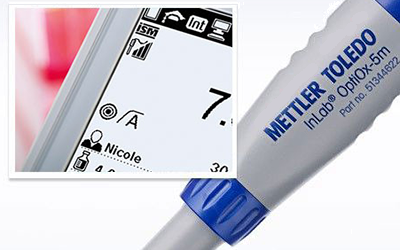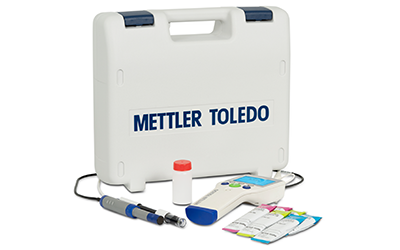A dissolved oxygen electrode measures how much oxygen is dissolved in a solution. The amount of free, non-compound oxygen in a product is a significant quality indicator for a variety of labs, including those engaged in pharmaceutical research, food and beverage quality control, and environmental monitoring.
METTLER TOLEDO manufactures optical, polarographic, and galvanic electrodes for precise DO measurements in a variety of laboratory and field settings.
DO Sensor InLab 605
Dissolved Oxygen Sensor

Image Credit: Mettler Toledo - International
- Measuring range: 0 – 200%, 0 – 20 mg/L
- Temperature Range: 0 °C – 60 °C
- Connector: BNC/RCA (Cinch) IP67
DO Sensor InLab 605-10m
Dissolved Oxygen Sensor

Image Credit: Mettler Toledo - International
- Measuring range: 0 – 200%, 0 – 20 mg/L
- Temperature Range: 0 °C – 60 °C
- Connector: BNC/RCA (Cinch) IP67
DO Sensor InLab 605-ISM
Polarographic DO sensor for various applications, including a temperature probe and ISM. Designed for tough conditions.

Image Credit: Mettler Toledo - International
- Measuring range: 0 – 200%, 0 – 20 mg/L
- Temperature Range: 0 °C – 60 °C
- Connector: BNC/RCA (Cinch) IP67
Advantages of METTLER TOLEDO's Dissolved Oxygen Electrodes
The Right Sensor for the Needs

Image Credit: Mettler Toledo - International
To correctly measure oxygen levels. Reliable electrodes for dissolved oxygen are required. The optical, polarographic, and galvanic electrodes provide reliable DO measurements in laboratory or field applications, thanks to a combination of high-quality materials and cutting-edge technology.
Optical Determinations

Image Credit: Mettler Toledo - International
The InLabR OptiOx™ DO sensors employ RDO® (Rugged Dissolved Oxygen) technology, which simplifies optical DO measurements. This ensures that no sample oxygen is used during measurement, resulting in a rapid, stable system that requires minimal maintenance. It is an ideal choice for measuring biological oxygen demand (BOD).
Polarographic Determinations

Image Credit: Mettler Toledo - International
METTLER TOLEDO's polarographic dissolved oxygen electrodes include a reinforced fiberglass PPS shaft and are intended for use in severe locations or applications where optical readings are not possible. These incredibly durable DO electrodes also have a highly permeable membrane, ensuring precise dissolved oxygen measurements.
Galvanic Determinations

Image Credit: Mettler Toledo - International
A galvanic DO sensor consists of two electrodes composed of different metals (of varying nobility) in an electrolyte solution. Wires link the electrodes, allowing electricity to flow. They are an affordable solution for obtaining high-quality measurements and complement the Standard Meter series.
Quick and Traceable Results

Image Credit: Mettler Toledo - International
The Intelligent Sensor Management (ISMO) technology allows the instrument to automatically detect the associated DO sensor and use the most recent calibration data stored on it. This guarantees safe, accurate, and traceable outcomes.
Measure Safely in Harsh Environments

Image Credit: Mettler Toledo - International
METTLER TOLEDO's dissolved oxygen electrodes are rated IP67, ensuring that the entire portable DO measurement system can endure damp and demanding outdoor applications while maintaining accuracy and durability.
All-in-One Solution

Image Credit: Mettler Toledo - International
METTLER TOLEDO offers comprehensive electrochemistry systems, including meters, sensors, calibration solutions, and software. Use Intelligent Sensor Management (ISM®) technology to enhance data compliance.